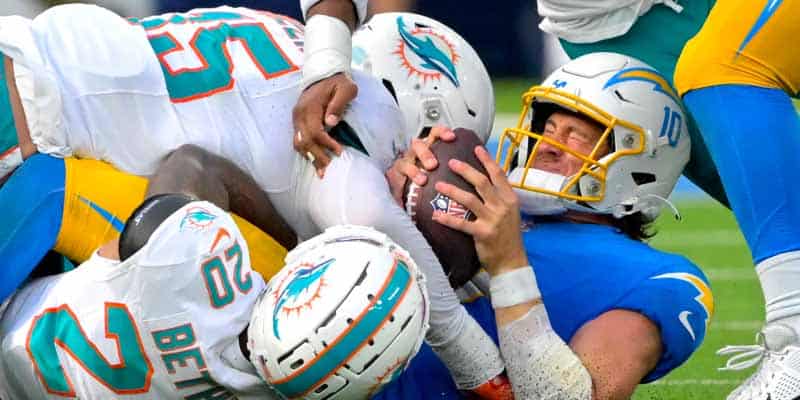With the start of the 2023 NFL season (or the end of it, if you’re a Jets fan), the nation’s most populous state is still on the outside looking in when it comes to legal domestic sports betting.
In 2022, it was looking like a sure thing that the Golden State would join the ranks of the majority of the USA in legalizing sports gambling. However, voters rejected Prop 26 and Prop 27. These two ballot initiatives weren’t just defeated, either. They were obliterated:
California Proposition 26 Results
“Expand gambling options at casinos and racetracks”
- Yes, allow more types of betting – 33.0%
- No, maintain current betting types – 67.0%
California Proposition 27 Results
“Legalize and tax online sports gambling”
- Legalize online sports betting – 17.7%
- Do not legalize online sports betting – 82.3%
In a state as “liberal” as California, these results were something of a surprise to most residents. And while we weren’t all that surprised at the overall result (simply because we were privy to the massive campaign against CA gambling expansion), we were surprised by the margins.
Sports betting is a hugely popular pastime, and millions of CA residents use legal online sports betting sites right now.
The rejection here wasn’t an issue of demand. That’s there, and in spades. No state has more hometown sports to bet on than California, and that’s true at both the professional and collegiate levels. Nor was it an issue of politics as such. With the defeat of sports betting and online sports betting at the ballot, the voters — not the legislators — had the final say.
In the end, it was an issue of commercial market appeal. Or, rather, the lack of appeal in the lack of a commercial market. See, the propositions didn’t allow for sports betting in a vacuum. All this was conditional, and it came with several other riders that made both props unpalatable.
First off, there was Proposition 26, which was described this way on the ballot:
“Proposition 26 allows in-person sports betting at racetracks and tribal casinos. It requires that racetracks and casinos that offer sports betting make certain payments to the state—such as to support state regulatory costs. The proposition also allows additional gambling—such as roulette—at tribal casinos. Finally, it adds a new way to enforce certain state gambling laws.”
See that?
Prop 26 wasn’t just about allowing sports wagering at the state’s 65+ Class III tribal casino venues. It was also about those tribal casino venues being allowed to offer a few specific table games — notably roulette and craps — that weren’t already available.
Without this rider, it’s unlikely that the commercial casinos just across the border in Nevada would have funded the fight against Prop 26 at all.
But they did, and they won.
Today, Vegas is still the only game in town (or almost in town, anyway) for CA residents who want to bet at the roulette table or shoot craps in real life.
Had the proposal stuck with sports betting alone, CA residents would be betting on sports with their favorite local casinos today.
With the failure of Prop 26, the utter failure of Prop 27 was guaranteed. Plus, Prop 27 was one of those “if this, then that” (ITTT) ballot measures. It needed Prop 26 to pass in order to itself have a chance at passage.
Here’s what the ballot measure sought to institute, verbatim:
“Proposition 27 allows tribes or gambling companies to offer online sports betting. It requires tribes and gambling companies that offer online sports betting to make certain payments to the state for specific purposes—such as to support state regulatory costs and to address homelessness. The proposition also creates a new online sports betting regulatory unit. Finally, it provides new ways to reduce illegal online sports betting.”
The rub here — and it would have been a rub even had Prop 26 been approved — is that sports betting was given tribal exclusivity.
In other words, only federally recognized tribal casino operators in the state would be allowed to host sports betting apps. They could do so on their own or in partnership with commercial sportsbooks (i.e. DraftKings, FanDuel, BetMGM, etc.).
Basically, Prop 27 would have precluded commercial California cardrooms from hosting sportsbooks, reinforcing the closed door against commercial gambling operators. This is another reason the deeper pockets of established national brands were tapped against the proposal in the lead-up to the election.
Here’s the takeaway: As long as commercial non-tribal casinos can’t have access to the rich California gambling market, that gambling market is going to stagnate.
Or it will so long as the voters buy the narrative that those commercial operators are selling.
Whether the 2024 ballot will have a reworked sports betting proposal that is limited entirely to sports betting remains to be seen. If legislators really want the pastime approved, they’ll bake in some limitations on how much they’re asking to expand the CA gambling market as a whole.
And it still might not work.
It’s a good thing that several of the best online California casinos have legal sportsbooks up and running. Join one of these, and you probably won’t care about domestic sports betting in the first place.
We sure don’t.
Source: CBS Sports

